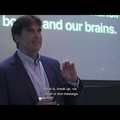Published: Világgazdaság Szeptember 20 / 2017
Nowadays we tend to consider digital transformation as sort of a panacea, a tool with which enterprises could find a solution to all the challenges arising from the revolutionary changes in all sectors of economy. However, reality is different: digitization in itself is far from being enough, as by simply getting rid of paper in the office, making our systems cloud based or developing a mobile app, we do not react on the biggest change appearing in the mind-set, thinking and behaviour of consumers and clients. If we digitize the already existing operational models, it would not enable better or more customer centred service, and one cannot solve cost efficiency related problems arising at the companies either. Thus digital transformation - in the form we recently refer to it - is simply a myth. A myth that holds out redemption, but does not embody the solution itself. Because it is not our current processes that need to be digitized, but - conforming to the changing consumer habits - new, digital models are to be established.
Based on the results of surveys the age group of 25-35 years old cannot be addressed by using the traditional tools, that is enterprises need to establish new methods so that they could communicate with them. And digitization makes it possible to create services and reform customer service by making them severe, getting rid of unnecessary processes, superfluous human intervention, thus the customer really gets what he desires. Moreover, thanks to the new communication channels and sales models, now decisions can be made really quick about whether a certain product or service is needed or not.
One should not have illusions: this results in a cruelly honest operating environment in which feedback comes immediately about whether it is good or bad what the company, the service provider does. Just think it over. In the past the taxi driver did not have to chew the cud about whether it is a problem that he had not shaved or changed his short for a clean one before going to work, as the dispatcher gave him one trip after the other, irrespective of what his clients thought about him. Now, if somebody decides to become an Uber driver, cannot afford to offer low quality services, as evaluation comes immediately, and if it is not up to the expectations, he can soon search for another job.
The real problem is that big companies are afraid of such evaluation method and immediate feedback. This is why they do not dare to make as much use of the opportunities offered by social media as they could. But what happens if somebody writes down his idea about us? We can learn from that and go on, do our job, but we are at least richer with an experience. It is a key of success to serve the original customer demand efficiently in a modern, transparent environment, where it turns out if it is good or bad what we do as quickly as lightning.
What is necessary to make it come true? Competition, value creation and a basic change of mind-set. The latter is most needed at the recognition of customer demands, as the companies revolutionizing traditional business models are usually better in knowing their consumers. At big enterprises the overwhelming majority of managers have not seen a client for years, have not had any relationship with them; they are informed via reports only, so no wonder if they are unable to assess the problems and demands thereof.
Like it or not, one can meet new approaches and business models in various segments of business life building upon the opportunities of technological development. The already mentioned Uber redefined the practice of passenger transport, Airbnb transforms not only the hotel industry but the real estate market as well, and fintech startups like Trasferwise pose new challenges to the bank and insurance sector. However, there is no need to be afraid of the competition; the strategy of evasion or hiding away will not work in the long run. Those companies will survive revolutionary changes in traditional sectors, which also aim at creating real competitors for themselves. They invest in startups, which are envisaged to be viable, or they could also work as business incubators themselves. They develop new things from their own resources, then, by establishing a more efficient and modern spin-off company create a competitor for themselves - first this model might sound scary, but the stimulating, incentivizing effect of competition can have a positive impact on the enterprise. This is exactly what we have experienced at UNIQA since we launched our R&D department that tries to find new solutions to classic tasks; since then we have experienced that the traditional part of insurance industry also pays attention and tries to keep up with the pace, as they see that something is about to happen and feel that they need to take a step.
So in order to make this approach operable adequate resources shall also be ensured. Here the primary challenge is not the lack of financial resources, but finding the appropriate colleagues. It can be seen that developments are speeding up at enterprises and instead of strategy makers executors are in the forefront; they are the ones who can implement ideas in reality. In most of the sectors the watershed between successful companies and those who fail will most probably be about whether these people could be found in the increasingly narrowing labour market.
A bejegyzés trackback címe:
Kommentek:
A hozzászólások a vonatkozó jogszabályok értelmében felhasználói tartalomnak minősülnek, értük a szolgáltatás technikai üzemeltetője semmilyen felelősséget nem vállal, azokat nem ellenőrzi. Kifogás esetén forduljon a blog szerkesztőjéhez. Részletek a Felhasználási feltételekben és az adatvédelmi tájékoztatóban.





